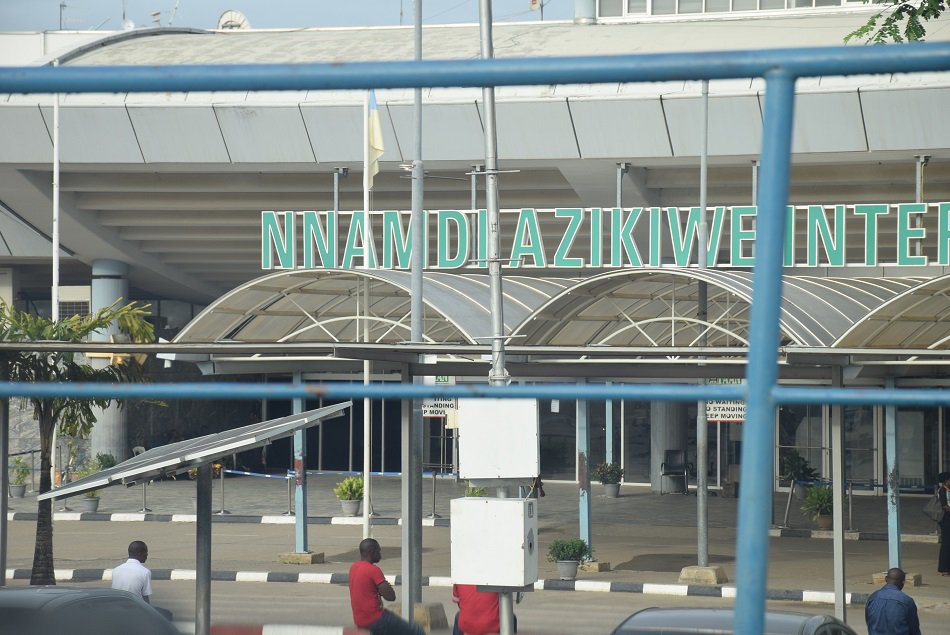- Flight Operations Begin at Abuja Airport’s New Terminal
The newly inaugurated international terminal at the Nnamdi Azikiwe International Airport, Abuja, has officially been opened for operations as Asky Airlines began operations at the terminal on Sunday.
Asky Airlines’ B737-700 aircraft with flight number ET-AVP, which landed at the airport at 3:30 pm from Lome in Togo, had 91 persons on board comprising 85 passengers and six crew members according to the News Agency of Nigeria.
Commenting on the maiden flight, the Managing Director, Federal Airports Authority of Nigeria, Mr Saleh Dunoma, said the new terminal had been positioned to meet passengers’ expectations.
Dunoma said he expected other international airlines to move into the new terminal as soon as possible, saying it was a great departure from what was obtainable at the old terminal in terms of equipment and passenger facilitation.
According to him, other airlines have to key in because “you cannot compare this terminal and the old one because if you are looking for safety, passenger facilitation and comfort this is the place.”
The Regional General Manager, North Central, FAAN/Airport Manager, NAIA, Mr Sani Mahmud, said the maiden operation was hitch-free with the successful processing of 91 passengers on board Asky Airlines from Lome, Togo and the departing passengers to Ndjamena on the same flight.
Mahmud gave the assurance that all the facilities in the terminal had been tested and certified perfect to handle all international flights, adding that the commencement of operation by Asky was a confirmation.
According to him, WiFi is available and trolleys are also available for free in the terminal.
“We thank God for making it possible that today, we were able to commence flight operations in the new terminal of the NAIA that was inaugurated on December 20, 2018 by President Muhammadu Buhari.
“We sincerely appreciate all the stakeholders that made this possible and as you can see, all the agencies are on the ground for international operations.
“We want to assure Nigerians and the world that this terminal will be maintained beautifully because we have a very good strong team in this airport.
“This is the same team that certified this airport in 2017, won the best-improved airport in safety this year and also won the airport manager of the year back to back in 2017 and 2018,” he said.
A passenger, who is a Chadian and married to a Nigerian, Mr Patricia Monomon, said she was experiencing the best flight in Nigeria for the first time.
Monomon said the terminal could be described as one of the best anywhere in the world, saying it was a great achievement in the air transport sector.
She urged the government and the airport management to ensure that the facility was properly maintained to retain the standard, adding that the major problem in Africa was maintenance.
“The last time I travelled through this airport was like a nightmare but I can’t imagine the experience of today in this same airport because this time round, it is really fantastic.
“It paints a good image about the country because the airport is the first place you see in any country and it is the experience you get from the airport that will determine your view about the country.
“If you meet such facility at the airport on your arrival, you will feel relaxed,” she added.
Also Isidore Nwoko, a Nigerian technician based in Ndjamena, said he was delighted to see such an airport terminal in the country, saying he was angry that Nigeria could not afford to have a world-class airport before now.
According to him, he can be proud anywhere in the world that Nigeria now has a beautiful airport.
“As it is now, it is good and I am urging the government to ensure that this airport is maintained and kept it clean as it is today,” he said.
The Director/Chief Correspondent, China Radio International, Abuja Bureau, King Wang, said that Nigeria, being the most populous nation and number one economy in Africa, deserved nothing less than the new facility.

 Forex2 weeks ago
Forex2 weeks ago


 Naira2 weeks ago
Naira2 weeks ago
 Billionaire Watch2 weeks ago
Billionaire Watch2 weeks ago




 Naira2 weeks ago
Naira2 weeks ago




 Naira2 weeks ago
Naira2 weeks ago




 Naira4 weeks ago
Naira4 weeks ago


 Naira6 days ago
Naira6 days ago
 Banking Sector4 weeks ago
Banking Sector4 weeks ago




















